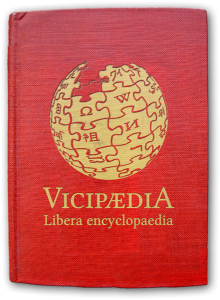Nerdimus Maximus: Latin Wikipedia
 There are a lot of nerds on the Internet (including me), but if I had to pick one of the nerdiest websites of all, it would have to be the Latin Wikipedia.
There are a lot of nerds on the Internet (including me), but if I had to pick one of the nerdiest websites of all, it would have to be the Latin Wikipedia.
Latinizing Modern Words
Even though I don’t speak Latin, I like to knock around on the Latin Wikipedia. I like to browse modern topics just to see how the editors latinize words and names that didn’t exist back in the days of Rome. Overall, I’ve seen three different methods.
- Adopt the name without changes: e.g. Barack Obama.
- Latinize the name while keeping its basic form: e.g. Baracus Obama.
- Translate the name based on its meaning: e.g. Benedictus Obama. (“Barack” means “blessed”, as does the Latin form of “Benedict”.)
The Height of Nerdiness
I don’t know what’s nerdier, people writing encyclopedia articles in a so-called “dead language”, or people arguing over the exact translation of every word. In any case, I think it’s a magnificent way to bring this ancient tongue into the modern world. And since Latin is still used for scientific nomenclature, these silly arguments between Wikipedia editors may end up having real-world ramifications.
When I say that Latin Wikipedia is one of the nerdiest sites on the Internet, I mean it as a compliment. I consider myself a nerd after all. And while I don’t speak or write Latin, I’m glad that there are people online keeping the language of the ancients alive and well.








10 Responses
[…] ignorance. Roman Numerals are important for historians and philologists. But like cursive or Latin, it’s a dead art, one that no longer makes sense to use in everyday life. As the sum of human […]
[…] been maintained by a much smaller user base. The modern website is maintained by a small cadre of geeky editors, with only the illusion of freewheeling […]
[…] to show off their mad vocabulary skills. But the title “Supreme Pontiff” comes from the Latin “Pontifex Maximus“, which was the title of the head of the Roman state […]
[…] conquered much of the Mediterranean, including Greece. This led to an influx of Greek words into Latin. These Greek words had funny sounds that weren’t in the Latin Alphabet, so a guy named Appius […]
[…] includes a deer, a bear, an eagle, a man with a rifle waving while standing on a beach, and two Latin inscriptions. Rather than put the whole coat of arms on the flag, I’m drawing out one […]
[…] where metric has caught on are the realms of science and military, fields that have used long Latinate words for […]
[…] a common source. Two thousand years ago, people all over the western Mediterranean were speaking Latin. After the fall of Rome, they continued speaking Latin. Over time, Spain was invaded by Goths from […]
[…] a P, it is actually derived from the letter C, as it was originally used to mark a new chapter (in Latin, […]
[…] number of loanwords in English relate to specific categories. Law borrows heavily from French and Latin, due to the Norman Conquest. Science borrows from Greek and Latin, the languages of ancient […]
[…] language, we use the word “surreal” to mean “not real”, but a quick look at Latin roots proves this wrong. The prefix “sur-“ is a shortening of “super-“, meaning […]